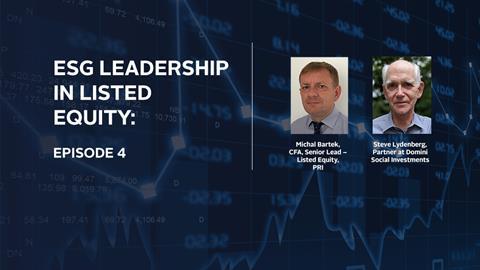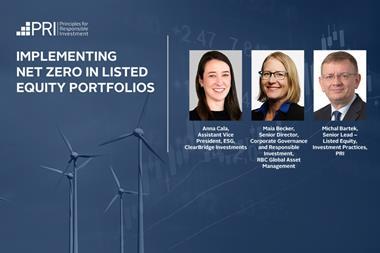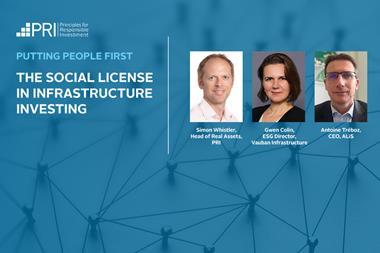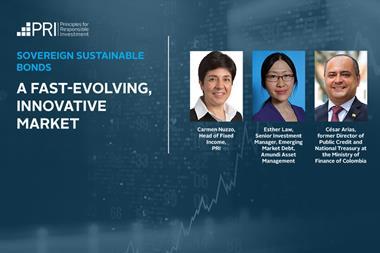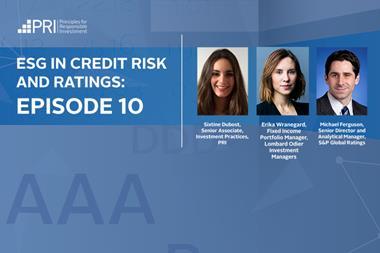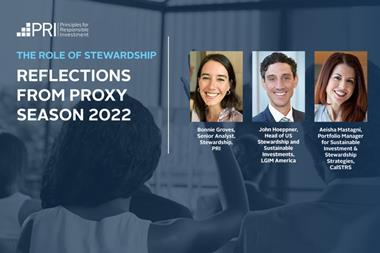In this episode of the PRI podcast, the PRI’s senior lead in listed equities, Michal Bartek speaks with Steve Lydenberg, a partner at Domini Social Investments.
They reflect on the key developments in responsible investing in decades past, discuss the nature of challenges that listed equity investors currently face and explore what it takes for listed equity asset managers to show leadership.
ESG leadership in listed equity episode 4
With Michal Bartek, CFA, Senior lead – Listed equity, PRI and and Steve Lydenberg, CFA, partner at Domini social investments and the founder and CEO of The investment integration project
Michal Bartek
Welcome to the PRI podcast. In this episode, we’re going to explore the state of responsible investing, where we are, what’s different now compared to the past and what it means for leadership in the state equities. My name is Michal Bartek and I work as senior lead in listed equities. With me is someone with decades of experience in this area. Steve Lydenberg, a partner at Domini social investments and founder and CEO of the investment integration project. Steve, looking at the evolution of investing over the last few decades, how would you describe where we are now and how things have changed over the years?
Steve Lydenberg
Yes, thank you, Michal for this opportunity. It is indeed an interesting, and I would say crucial time, for responsible investment and it’s important to understanding where we are now and where we are heading. And certainly, there have been major changes in the field since the 1970s when I was first involved in it. And I’d like to highlight just three that I think are particularly important, that increases in the ESG data that is available behaviour. And when it comes to social and environmental issues the activism that shareholders are now taking with regards to these issues and the re the availability of responsible investment product. So, in the 1970s, there was really next to nothing in the way of corporate of their social, environmental, and even corporate governance areas. So, the transition from there to now is quite dramatic with virtually all corporations, large corporations issuing social and environmental reports of one sort or another.
And the exception these days is the company that does not report. And that is the polar opposite of what it was in the 1970s on the activism front. In the 1960s, there were what were referred to as corporate GAD flies that were raising some social, environmental, some corporate governance issue issues. And they were essentially dismissed out of hands, watered away. Then in 1970, Ralph Nader discovered that you could go to corporate annual meetings, indirectly confront management on these issues, whether it was board diversity or community involvement, by the 2000s institutional investors had realised the importance of these and that was a time when PRI was founded and now even central banks are taking climate change. Seriously engine number one is having its nominees elected to the board of Exxon Mobil and even Carl icon is raising human rights issues.
So, vast difference and also on the area of product in the 1970s, there were literally just a handful of products at the beginning of the 1970s that could be classified as being the kind of products we see today. And now most asset managers offer a variety of social and environmental responsible investment products. So, this all reflects what I would see as a growing demand, an expectation that companies will disclose that investors will engage and it has raised certain expectations. And those expectations are that companies and investors engaged will be able to confront some of the biggest problems that we face today,
Michal Bartek
Interesting, we’ll come onto the ability of the players to satisfy the demand in a little while. But first of all, what about that demand? Why now?
Steve Lydenberg
The answer to that question is fairly straightforward. The world has changed quite substantially since the 1970s. And, there is an intuitive perception that investment needs to change to reflect what is going on in the broader environment around it. I mean, we’ve always had social and environmental problems, but there’s a sense now I think that they are different in some way, there are more goal, more complex, and I’m not, I don’t mean to apply. We haven’t made progress in addressing these kinds of problems since the 1970s, but with the progress we have made is also kinds of challenges.
Michal Bartek
So, what would you say about the challenges? I guess they are bigger than what they were in the past.
Steve Lydenberg
Yes. And the differences I think are real. They are more global. They are more long term, the kinds of things that challenges that are difficult to reverse, if change takes place in the way it’s, it seems to be, be threatened and the challenges are complex. And all of this is taking place in the context of an increased, dramatically increased role of finance in the economy. So just for example, the 1970s in the US, our cities and the environment were pretty much a mess. The headline problems were things like the Cuyahoga river in Cleveland catching fire, an entire community was built on a toxic waste site in, love canal and upstate New York banks were redlining whole neighbourhoods, because of their racial and economic, constituents there. So, these were front page issues and their causes were relatively clear.
And in a certain sense, their solutions were you pick your head around what the solutions were to them. But now the problems that we face are more like polar caps are melting, entire oceans are polluted with plastic. Banks aren’t just being taken to task for their community lending, but on climate, taxes, corruption. It’s, it’s not just that the bald eagle, which went on the endangered species list in 1978 was a symbol of possible extinction. But now we’re talking about a whole sixth extinction species across the whole spectrum, including insects, which we’ve never paid much attention to before. And, and what’s the meaning of something like that. And in the meantime, finances it’s in the economy has grown in, in 1950 it’s it was about 2.8% of the GDP by 2006, it was 8.3%. So these kinds of evolutions of the problems and the context that we’re facing, I think require account for that sense, that investment has to change also.
Michal Bartek
So the challenges are different. Are there too many of them?
Steve Lydenberg
Well, actually I think they’re relatively few in the sense that I’m talking about them, what I would call a systems level for investors. A systemic challenge means something that’s has impact on all their asset classes. There’s no place to hide from climate change. You can’t diversify it away. So, in the environmental area, you might say climate change, biodiversity loss, food security, as reaching that kind of rather high threshold, in the social area, income inequality, the effects of digitalisation of so many aspects of our society, of access to health and, I and technology. And, and of course in the financial area, there’s always a question of stability, but we’re talking about now instability that has caused things like the 2008 crisis. So, there aren’t many of them, but these are likely to be with us for a long time.
Michal Bartek
So that brings us to the issue of how to satisfy expectations and all the promises being made. This touches on greenwashing and the question of whether what’s happening now by investment and corporate managers is just a token gesture or if it’s real change. It may not be as simple as this, but is the hope that a tweak would be enough.
Steve Lydenberg
Yes, this is a crucial question. And I think they have to start with the assumption that the demand for investors and finance to deal with these questions is real. I think that’s demonstrated simply by the number of products that are out there. They certainly are finding an interested market and also on the corporate side, I think it’s worth noting that the there’s a kind of, I would say intuitive sense again among corporate leaders that a more of a stakeholder model of the corporation than just simply one based on stock owner, primacy is necessary. And that’s the significance of that letter that in 2019, that 180 CEOs signed, but those are indications of the perception that change and the problems need to evolve, but making it happen is difficult. And to answer your questions, tweaks will not do the job, it requires some kind of fundamental change and, and investors are exploring a number of pathways to that fundamental change.
And the three of them that I think offer particular promise. One is the movement focus on portfolios to a focus on influencing the systems around those portfolios that influence the portfolios and that the portfolios themselves influence second is the whole question of business models. Business models for investors have been based on competition. There is more of a sense that collaboration is necessary now, in order to get to that kind of system level, the competition alone, won’t get there. And finally, there’s a shared vision, the necessity of a shared vision among investors of where we’re going. So this is the kind of fundamental change that I think is necessary.
Michal Bartek
So can you expand on those three approaches you’ve outlined?
Steve Lydenberg
Yeah. So, let’s start with the, the one that’s, that’s relatively clear. I would say clients, you know, may want clean portfolio. That’s the shift from portfolios to a simple portfolio approach, to more of a, a systems level of approach by investors in, in terms of the products and services and tools that they’re using and clients may want clean portfolios. And, and that’s a very useful step, but when you want change at a systems level, investors increasingly I think are realising that just clean portfolios alone are not the only tools that they have to use to, to influence systems. There are other powerful tools and there’re things like collaborative engagement, not single engagements with a single company in your portfolio, but collaborative engagements on industry. There are taking positions on public policy issues that will facilitate change of the kind that is needed at the systems level for investors to invasive address the problems they’re facing. There’s the sharing of data on a pre-competitive basis on the nature of the systems level challenges. They’re setting standards at industry levels. There’s taking intrinsic value of the systems into account. These are the kinds of tools that, that investors can explore in addition to just focusing on their portfolios.
Michal Bartek
And, and what about your other suggestion that is the need for business models to change?
Steve Lydenberg
Yes, this is one of the more difficult challenges to address. We want to address climate change, but the current business model of fossil fuels is very efficient and changing those business models is difficult. We want to invest in a circular economy, but the infrastructure isn’t there now. We need to infrastructure changes there. And, and finance, I mentioned this before. I think this is an important point as based its business model, basically on competitive principles, we compete against all our neighbours, but collaborative efforts are now necessary if we’re going to get to that systems level. So these are not easy transitions too
Michal Bartek
Some of that changes already happening. Isn’t it?
Steve Lydenberg
Yes, it is. But it’s complicated. So let me just take the example of our current example of the move toward commitments to net zero greenhouse gas emissions by 2050. So, climate action, which was an example of collaborative engagement Climate Action 100+ plus an example of collaborative action has been very successful in getting really a preponderance of investors over 600 investors to agree in setting a goal. And that is reduced GHG greenhouse gas emissions for the largest emitters. And that goal has taken the form of this net zero by 2050 goal. So it is a shared goal, but three different business models are emerging on how to get there. So, and one is a straightforward one switch away from fossil fuels and other greenhouse gas emissions and a second is an entirely different approach, which is getting to a new line of business, which is extracting carbon from the carbon dioxide, from the atmosphere in offsets. That’s the net part of this. And, and the third is just a hybrid of those two approaches.
So, you have collaborative goals, they have difficult business models in all of them. So the first is difficult for certain more difficult for certain industries than others. Steel, for example, or airlines switching over from fossil fuels is very challenging. But on the offset side, there’s a whole set of new challenges on what’s the most effective offsets. Will they last as long as they need to et cetera. And then there’s the question of balancing the two. So what we have is competing business models and company investors, companies, and investors will have to bet on which business models going to work. So it’s a delicate balance, and I think it’s going to be one that will show up in various aspects of these system, systemic chain. How do you compete on how do you agree on goals and then how do you compete on ways to get to them?
Michal Bartek
So obviously a shared vision is needed on system level goals, isn’t it?
Steve Lydenberg
Exactly so shared visions are, a shared vision is essential. It’s crucial out it progress will be very slow. It’s intentional because voluntary collaborative actions depend on a shared vision. And then when voluntary collaborative actions, aren’t enough a shared vision between investors and government is essential so that governments can set the regulations that will, can in implement the regulations, that’ll set the, the ground rules that are necessary for progress.
Michal Bartek
So here’s the big question. How can we actually achieve that?
Steve Lydenberg
Well, we will need a number of different initiatives to make sure that we’re all talking the same language and ensuring that the ends that we have in mind are all the same. So let me give three examples. One has to do with communal collaborative standard setting, one with open communications between investors and government, and finally the embedding of a vision of a shared vision for social and environmental goals in financial products. And we can see some initial developments in all three areas and very promising things, I think. So for a long time in the area of standard settings, there have been many different ready rating agencies, many different forms of disclosure, all of which set standards, and quite often diverge from each other. So now with the recent announcement of the creation of the international sustainability standards board, there is the promise of a broadly recognised platform for shared standards, a platform to which most can agree.
There may be some tweaks that people may want to make with it, but there will be some general agreement to it, and it will be especially meaningful because it will imply, I think, a new vision for the role of accounting in the broadest sense. So this, if we can agree that accounting itself has a shared vision that encompasses social and environmental issues, that will be major progress. The second on communications between government and investors. So just for example, CERE, the environmental, NGO in the United States that works with large institutional investors there recently wrote a letter signed by 35 of the largest pension funds in the US asking the Biden administration to make, to do, to clarify that the climate change is a systemic risk and therefore requires systemic solutions and asking or in effect endorsing certain kinds of changes that government could make to help to go in the, that direction.
So it’s important that government hears from investors that there are working solutions that it would agree to from a regulatory point of view and finally from the financial products point of view, what I mean by like this embodying of shared vision in financial products can be seen, I think in the merging of what you’re getting now between passive investments, index investing and social environmental standards. So, this merging they’re now probably several thousand of these indexes out. I know that NNCI has over 1500 of them. Some of them are value based on sustainability based, but they are all have this combination of an index approach with sustainability, responsible investment overlay. And there are three important implications of this since passive investing is one of the dominant teams of investing today. Having this merging is, is three important implications.
First, that social and environmental considerations can and should be built into financial products. And second, that the benchmarks for performance of fin of financial products will contain social and environmental considerations. And finally, that finance itself involves a vision of not just future markets, because investments are a bet on a future market, but it is also a best, a bet on future societies in the sense that broad market indexes are representations of at least a, a broad sense of society. So standard setting communications with government and the structure financial products are, will all be important steps in, in creating those shared visions.
Michal Bartek
I can appreciate that but if that’s where we’re headed, what does it take to show leadership?
Steve Lydenberg
Well, first, should say that none of this will happen without leadership. Leadership that is willing to take these large issues under consideration and make the fundamental of changes that are necessary to, to bring about those changes. So it will require and effect some new skills and the leadership will need to be comfortable with, I think, three essential things or three essential things will help greatly in any case. And they relate to, what I would refer to as balance to uncertainty and to excellence of character. So what I mean, when I say balance in investing between tensions that pull investors in different directions is nothing new. We’re all familiar with the tensions between risk goals, for risks and returns. There has to be a balance between the two appropriate balance, depending on context. So systemic issues raise that same kind of challenge when it comes to balance.
And here’s what I mean by that. Systemic issues tend to be very long term, but investors and investors want those addressed, but investors also have short term obligations. So there needs to be a balance between the two. And this again is not a new idea in the sense that it shows up in trust law. There’s something called the duty of impartiality, which says the trustees of multi-generational assets cannot favour one generation over another and pension funds another sense have the same challenge. They are obliged to provide benefits to those that are retiring 1, 2, 3 years out and make, make sure that they can retire at the same time, account for those, serve well, those that are out, 30 retiring, 30 years plus out. So that tension between short term and long term is just one of the tensions. And there are others that systemic challenges pose but we can’t simply dismiss one of the aspects of that long term for the short term or the short term for the long term, but we have be concerned with both, if we’re going deal with these systemic challenges.
Now what I mean by uncertainty is really accepting that there are irreducible uncertainties that arise when you have systemic challenges, we are all used to accurate identification of performance, attribution factors. Okay. We can see cause and effect when it comes to performance of portfolio, but cause and effect when we come to a systemic issue is much harder to determine multiple actors, complicated systems and outcome outcomes are unpredictable and it is not uncommon for one, input to produce the desired output. So, what tools can be used in that situation are important. And one of the tools is scenario analysis scenarios are designed for fluid situations and that’s why the task force for climate related financial disclosures has required scenario analysis with related relation to climate change for those reporting on it.
So scenario analysis, uncertainty, and being a able to develop a skill in the area of scenario analysis for example, is the second thing. And then this other concept that I refer to as excellence in character. And what I really mean here is I think can be captured by the phrase of an investor, a leader in investor when facing systemic issues needs to be able to quote unquote ‘do the right thing’, make the right decision when situations are unprecedented, they’re unfamiliar, unpredictable, cause that’s the nature of these new challenges that we’re facing. And Roger Martin in a recent book has pointed out that greater efficiency is not always the right answer when we’re facing these kinds of situations you need experience and knowledge, in order to address these. And that is built from that kind of character is built from experience this experience and practical knowledge. So, in short understanding balance, understanding uncertainty and being and how to manage it and developing excellence of care characters will be crucial for leaders in investment if they are to deal with the 21st century challenges that we are now facing.
Michal Bartek
Fascinating. Steve, thank you very much for sharing your observations. I hope you enjoyed listening to our conversation. If you enjoyed this podcast, please do rate and subscribe and tune in to the next PRI podcast. For more information on responsible investment, go to our website unpri.org.
Downloads
Transcript: ESG leadership in listed equity episode 4
PDF, Size 0.23 mb


